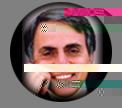|
|
CARL SAGAN
Carl
Sagan was an astronomer, educator and author. He popularized science,
inspiring millions of Americans to open their minds to the wonders
of the universe.
"Carl was a candle in the dark," Yervant Terzian, chairman of Cornell
University's astronomy department said. "He was, quite simply, the
best science educator in the world this century. He touched hundreds
of millions of people and inspired young generations to pursue the
sciences. He will be deeply missed by his colleagues and friends
at Cornell and around the world."
Sagan's PBS series, Cosmos, became the most watched series in public-television
history. It was seen by more than 500 million people in 60 countries.
The accompanying book, Cosmos (1980) was on The New York Times bestseller
list for 70 weeks and was the best-selling science book ever published
in English.
Sagan was a major force in support not only of planetary exploration
but also of the Earth's environment. His research focused on topics
such as the greenhouse effect on Venus, windblown dust as an explanation
for the seasonal changes on Mars, organic aerosols on Titan (Saturn's
moon), the long-term environmental consequences of nuclear war and
the origin of life on Earth.
An astronomy professor at Cornell University since 1968, Sagan received
a bachelor's degree in 1955 and a master's degree in 1956, both
in physics, and a doctorate in astronomy and astrophysics in 1960,
from the University of Chicago. Among Sagan's numerous awards in
literature, science and education, he was the recipient of the Public
Welfare Medal, the highest award of the National Academy of Sciences.
The award is given "for distinguished contributions in the application
of science to the public welfare."
Sagan, the Professor of Astronomy and Space Sciences and director
of the Laboratory for Planetary Studies at Cornell University, died
at age 62 on Dec. 20, 1996, in Seattle, Wash., after a two-year
battle with a bone marrow disease. The cause of death was pneumonia.
He continued to supervise undergraduate and graduate students at
Cornell University and to do research during the months prior to
his death.
"Through his writings and television productions, he brought the
excitement and challenges of scientific discovery into the homes
of millions of families here and abroad," said Cornell President
Hunter R. Rawlings III. "We will sorely miss him, but his legacy÷will
last for generations to come."
|


